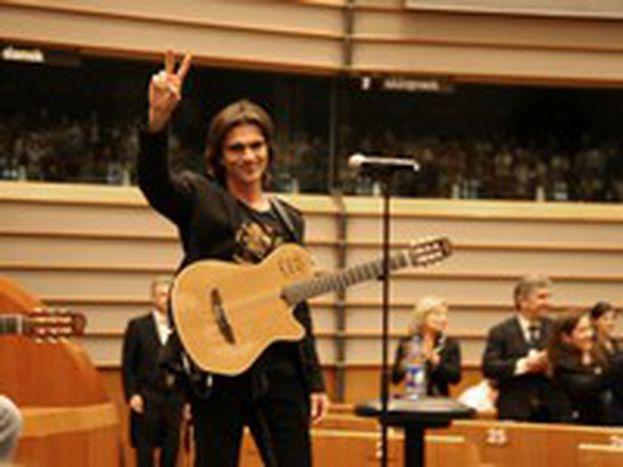
Juanes and the Future of the European Parliament
Published on
Translation by:
 claire mcintyre
claire mcintyre
On the 19th April, the Colombian singer Juanes played his guitar and sang in front an audience of MEPs unafraid to get up and dance, revealing their less serious side
Between them and the South America music star, a blue banner drew attention to the fact that the concert, staged on a day dedicated to society’s fight against antipersonnel mines, took place in the European Parliament.
Naivety would lead us to believe that, given the importance of the institution where this occurred, the television exposure of the unlikely pairing of Juanes and the European Assembly must of clearly be for the benefit of the artist’s image. However, on closer examination, it becomes clear that actually it is the EU in search of promotion, rather the famous Colombian singer.
Not just political dinosaurs
“We have to find new political ways to make sure our mission reaches the public. The truth is that the Juanes’ presence gives it new momentum, it shows a renewed vision of our relationship with young people,” maintained one of the concert’s organisers, the Spanish MEP José Ignacio Salafranca, who also enthusiastically pointed out that “even people in the interpreting booths were dancing.”
What is certain, at least, is that pictures from the event act as proof of this remarkable event. Contrary to the popular belief that Brussels is solely constituted by political dinosaurs determining the future of the Union, the Parliament actually included a fair proportion of young people on their feet, dancing in their blue seats, some less inhibited than others.
With or within the constitution, change is vital
All European politicians know that perhaps the most significant things the EU can do to reach its citizens is to bring attention to what actually happens in parliament, and try to banish some of the stereotypes. Therefore it is not such a bad idea to try and make its activities more visible by using more original methods, like inviting performers or other well-known personalities who can make use of their fame.
In any case, what is most pressing is to make it as easy as possible for Brussels to hear public opinion, and the only way this can happen is by speeding up the transfer of power from the Council of the European Union to the Parliament.
It is clear that delays in the Constitution make this process more difficult, but this cannot be used as an excuse. On the contrary, many of the ‘no’ votes against the constitution represent a democratic deficit, a reason why many euro-sceptics vote against the EU.
Therefore, if Europe has been built upon political agreements from above all these years, then why not sign new intergovernmental pacts that bring the EU and its citizens closer together? Wouldn’t this be the real plan D, for democracy, which Europe needs?
Erratum: Due to an editorial mistake, Susana del Río Villar was incorrectly attributed authorship of this article for a brief period. Please note that the real author is Xavier Hervás and Susana del Río Villar has never espoused the views contained in this article. We ask for her forgiveness and hope no lasting damage has been caused.
Translated from Juanes y el futuro del Parlamento Europeo


